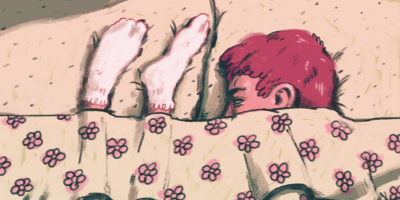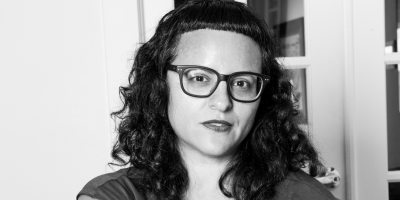Nonfiction
Never Write From a Place of Despair
by Erika Anderson

Never write from a place of despair, especially if it is your thirty-third birthday and you have just spent far too much on a Japanese notebook and a pen that looks like a pencil. Never write from a place of despair in your brand-new Japanese notebook with your pencil-looking pen if you are sinking in the shadow of last night on a train to Harlem with a five-count of Cinco de Mayo churros and you are wondering what it all means.
Never write from a place of despair, especially when you are less and less sure what despair means and whether it is the name of your condition—if a sentiment is indeed a condition. What if the name of your condition is weltschmerz, but instead of weariness of the world at large it is merely weariness of your own world, where everything is weightless, where every question is a shard of glass, each shard embedded in your skin? (Is that why you are so sensitive? Because your epidermis is cotton-candy fiberglass?) What if you are nothing more than earth tethered to air, and therefore you are tethered to nothing?
Never write about the fact that it is on your thirty-third birthday when you learn that the man you were once married to, the man you left in Europe, is now within the confines of a new relationship. Which is maybe why, when you last spoke to him, with his Jesus hair and his stud earrings, telling him about your grandmother’s death for the third time because he couldn’t remember the first or the second, the look on his face was more appropriate for talk of tomatoes. (Do you prefer beefsteak or vine?) Maybe he was blissed out on love and knew nothing beyond that present, like who you are now or who you were to him. You had told yourself you wanted him to be happy, to find someone who loved him more than you ever did, and yet here he is, and there it is, and you do not feel the way you promised. “She never seemed like a grandma,” he’d said. And there is a way in which he is right (she drank, she was cruel), and a way in which he is unkind (the mother of my mother is a mother of mine).
Never write about how many people wish you happy birthday or how they wish it. Never admit that they call you lovely, beauty, or dear. Never count the number of times you have been called an angel. Never count the number of times you have wondered if you are one. Do not feel overwhelmed by love; shake your head yes in its shower. Do not question love; there is no room for doubt (and yet doubt always tick-tocks its way into your heart). You thought your husband never loved you because he could never touch you the right way. He hated that there was a right way—he wanted to pet you like a puppy, to paw at your blonde-haired forearm, to stroke the heft of your thigh, for that to be good enough. But it wasn’t, and that broke him and it broke you.
The truth? He loved you very much. (But not the right way.)
When you write about last night, about the party you threw for your thirty-third birthday, never write the phrase: best. party. ever. It is tired and forced, the dominion of bros and beer. (Remember, you are above this dominion: you drink prosecco, champagne if you’re lucky. You must say something significant. Your words must have Meaning.) But the fact remains: it was the best. party. ever. Everyone came to play your reindeer games, to silly string, to ping-pong, to hopscotch, to cowboy hat, to photo booth, to moustache, to tutu, to down frosting like Jell-O shots, to dance floor with your DJ. You jousted with your pomaded coworker on rolling office chairs, a foam noodle in your hands, your friends pushing you from behind. You tore his noodle away and bopped him on the head. He was the field mouse and you were Little Bunny Foo Foo. A childhood rhyme come true.
Never tell people that you have “figured it all out.” Last time you said this—three years ago exactly—you left your job, your husband, and the Alpine country where you lived, the country that would never be yours. You would never be Swiss, you would always swipe away your concerns about your borrowed life in your borrowed country. The snow-capped Mont Blanc would so rarely appear through the clouds, and a road to work lined with 192 flags is still just a road. The postcards you sent home were merely background, ideas of a sky you could never touch.
Do not cry in the subway car on the A train while a young blond girl in a zebra dress twirls around the metal pole. Do not think you are alone in this world.
And when you inevitably think about how alone you are in this world because the young blond girl in the zebra dress twirls in a way you are sure you have never twirled, will ever twirl, do not divide your list of friends into “real” and “fake” based on who came to your party. Not everything is personal. But some things are. As friends fall away, you will wonder if they were ever truly friends to you, and you will remember the sleepovers, the time they brought all of their friends to your reading and packed the bar, the time you took a cab from the airport to cry on their couch, and you will know. There is no revision, and there is no retreat. Time is not a wave from a far-flung shore. It is a line, and you are walking it.
Do not wish that you were younger, that there were no clock. Where else would you find the urgency? How else would you write?
Do not give your number to the next man who smiles at you and says, “Don’t you look fine,” and follows you into the subway car, telling you he must have been compelled to buy a breakfast sandwich near the Nostrand stop on the A train because the stars aligned so he could meet you. Except that when he asks you what you do and you say you are a writer, his eyes deaden because now you are a person and not just a body and he has nothing to say.





